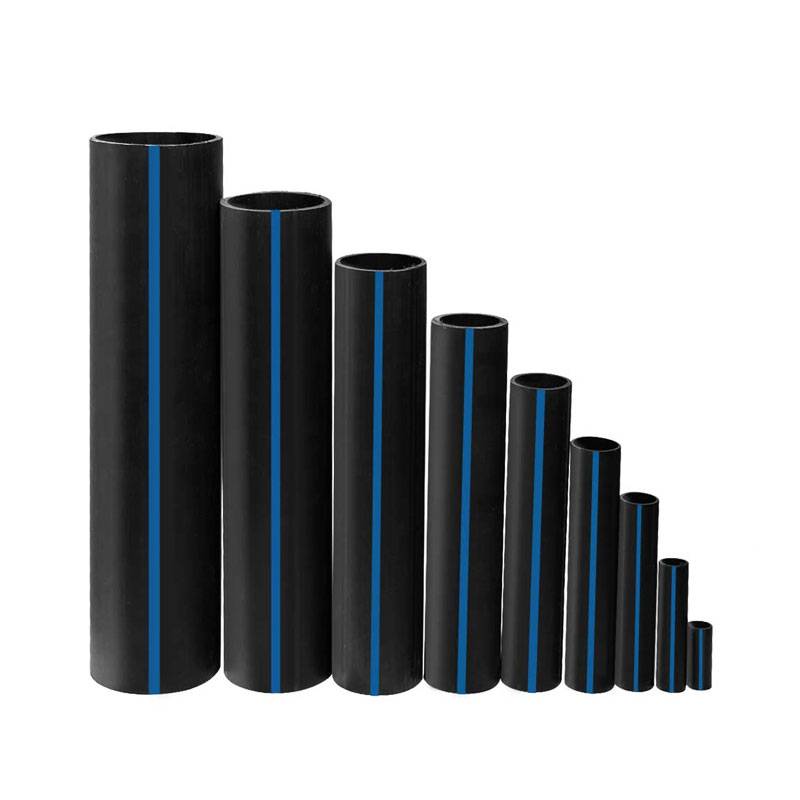Why Pipe Supplier American Plastics Midland Is the Top Choice for Contractors
Recognizing the Key Conveniences of HDPE Pipeline for Water and Wastewater Management
Making use of HDPE pipe in water and wastewater administration offers numerous benefits that warrant factor to consider. Its extraordinary resilience and lengthy life-span make it a favored choice for lots of jobs. Additionally, the product's resistance to rust and chemical damage boosts its dependability in different settings. However, the benefits expand beyond simply durability and resistance. Exploring its cost-effectiveness and ecological influence exposes much more compelling reasons for its prevalent fostering in modern-day framework
Extraordinary Resilience and Longevity

HDPE pipe stands apart for its outstanding resilience and long life, making it a favored option in water management systems. Constructed from high-density polyethylene, these pipelines can withstand significant stress and stress, making sure reputable performance over time. Their durable nature permits them to withstand severe environmental conditions, including temperature level variations and dirt motions, which can create other materials to stop working.
The lifespan of HDPE pipelines commonly exceeds half a century, giving an affordable solution for districts and industries alike. In addition, the product's lightweight properties simplify setup, lowering labor prices and durations. This longevity minimizes the need for constant fixings or substitutes, further boosting its economic allure.
In water monitoring applications, the integrity of HDPE pipes suggests fewer interruptions and improved service connection, making them essential to lasting infrastructure advancement. The combination of toughness and longevity solidifies HDPE's role as a keystone in effective water administration options.

Resistance to Deterioration and Chemical Damages
While numerous materials surrender to deterioration and chemical damage gradually, HDPE pipes show impressive resistance, making them optimal for different water administration applications. This resilience originates from the molecular structure of high-density polyethylene, which is inherently non-reactive and does not rust like steels or weaken from direct exposure to severe chemicals. As an outcome, HDPE is extremely reliable in settings with hostile materials, such as wastewater systems that might include acids, bases, and organic solvents.
Furthermore, HDPE pipes can stand up to environmental factors such as dirt level of acidity and saline problems, further improving their suitability for diverse applications (hdpe pipe fittings Midland TX). Their capacity to maintain architectural integrity over time lowers the threat of leakages and failures, which is important in making sure the safety and integrity of water distribution and wastewater monitoring systems. Consequently, the resistance to corrosion and chemical damage substantially adds to the total effectiveness and longevity of HDPE piping solutions
Cost-Effectiveness and Financial Advantages
When thinking about the monetary ramifications of water administration systems, the cost-effectiveness of HDPE pipelines comes to be noticeable. These pipelines offer reduced installment and maintenance expenses contrasted to standard products like metal or concrete. Their lightweight nature streamlines transportation and setup, resulting in lowered labor expenses. Furthermore, HDPE pipelines display a lengthy life expectancy, typically exceeding 50 years, which equates to less replacements and long-term financial savings.
The resistance of HDPE to corrosion and chemical damage lessens the need for expensive repairs and replacements. The pipelines likewise support efficient water circulation, reducing energy expenses connected with pumping systems. By alleviating leakages and water loss, HDPE pipes contribute to considerable financial advantages for municipalities and industries alike. On the whole, the first financial investment in HDPE piping can produce considerable economic returns over the lifespan of the water monitoring system, making click here to find out more it a sensible choice for lasting infrastructure growth.
Environmental Sustainability and Lowered Influence

Versatility and Flexibility in Installation
Since of their unique buildings, HDPE pipes supply amazing versatility and versatility in installation, making them appropriate for a wide variety of applications. Their light-weight nature permits easier handling and transportation, lowering labor expenses and installation time. HDPE pipelines can be bent and shaped to fit various surfaces and project needs, which is especially helpful in testing atmospheres.
Additionally, their resistance to rust and chemical damage permits for setup in varied settings without the requirement for specialized safety finishings. The capacity to fuse joints creates a constant, leak-free system, boosting the overall stability and integrity of the setup. HDPE's versatility likewise accommodates ground movement, minimizing the threat of damages in locations susceptible to changing soil. Generally, these features make HDPE pipes not just functional but also a recommended selection for water and wastewater administration systems.
Often Asked Inquiries
Exactly How Does HDPE Pipe Contrast to PVC in Water Administration Applications?
HDPE pipeline uses exceptional versatility, resistance to deterioration, and durability contrasted to PVC. Its lighter weight facilitates less complicated installment, while its lengthy life expectancy decreases replacement prices, making HDPE a favored option in water management applications.
What Is the Lifespan of HDPE Piping Under Regular Problems?
Under common conditions, HDPE pipelines can have a life-span ranging from 50 to 100 years. Their resilience and resistance to corrosion add to their long-term performance in numerous applications, making them a reputable selection for facilities.
Are HDPE Water Lines Recyclable After Their Service Life?
Yes, HDPE pipes are recyclable after their solution life. Texas hdpe pipe manufacturer. They can be refined and repurposed right into brand-new products, considerably decreasing environmental impact and advertising sustainability within the jetting drain lines sector, making them an eco-friendly selection for piping solutions
What Is the Installation Process for HDPE Water Lines?
The setup process for HDPE pipes entails website preparation, trenching, pipeline fusion or mechanical signing up with, backfilling, and pressure screening. Appropriate methods assure a long lasting and reliable system for delivering water and wastewater effectively.
Can HDPE Pipeline Be Made Use Of for Both Safe And Clean and Non-Potable Water Systems?
Yes, HDPE pipes can be made use of for both potable and non-potable water systems. Their adaptability, longevity, and resistance to corrosion make them appropriate for numerous applications, ensuring risk-free and effective transportation of water in different contexts.